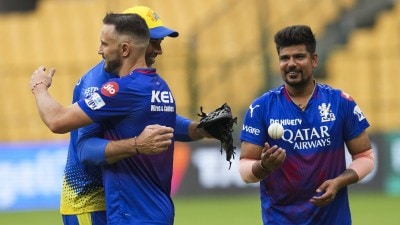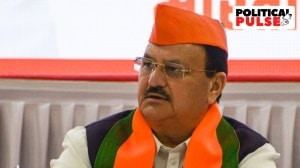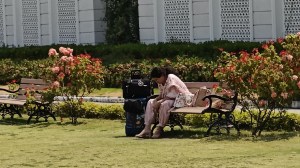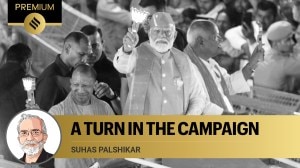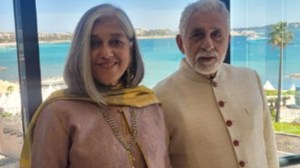- India
- International
Who is Sadiq Khan, the Pakistani-origin Mayor of London now re-elected to the post?
Sadiq Khan has served as the Mayor of London since 2016. His recent win was expected, but it nonetheless marks an important win for the Labour Party with the UK set to hold general elections soon.
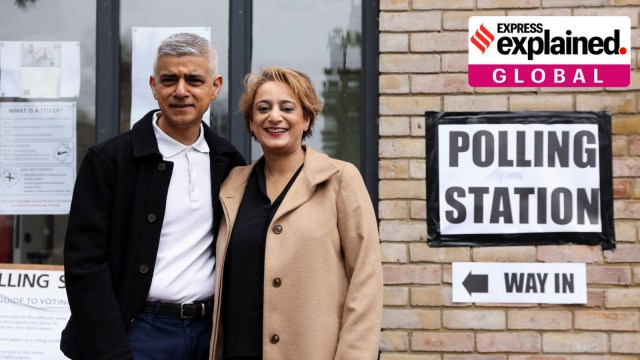 Mayor of London Sadiq Khan and his wife Saadiya Khan stand outside a polling station during local elections in London, Britain May 2, 2024. (REUTERS/Hollie Adams)
Mayor of London Sadiq Khan and his wife Saadiya Khan stand outside a polling station during local elections in London, Britain May 2, 2024. (REUTERS/Hollie Adams)London mayor Sadiq Khan was re-elected to the post on Saturday (May 4), marking the Labour Party leader’s third consecutive victory in mayoral elections. In 2016, the Pakistani-origin leader made history after becoming the first Muslim mayor elected in any major Western capital.
That’s not all. His victory margin at the time, garnering 57% of the total votes, was the largest personal mandate in the history of British politics at the time. With his recent victory, the 53-year-old becomes the longest-serving Mayor of London.
While his re-election this time did not surprise observers, it nonetheless marks an important win for the Labour Party. The United Kingdom is set to hold general elections no later than January 2025, and Labour is looking to regain power at the national level for the first time since 2010.
Here is the story of Khan’s rise, and how his popularity has endured among Londoners despite certain criticisms.
Pakistani parents, early work as a human rights lawyer
Khan has often spoken about his humble beginnings in his election campaigns, and the framing of his story is believed to have resonated among voters. He was born in London to Pakistani immigrant parents. His father worked as a bus driver and his mother was a seamstress, according to an Associated Press profile.

In a 2016 interview with New Statesman, he recalled: “My mum and dad would send money to their relatives back in Pakistan. My mum still does, because we’re blessed being in this country.”
He spent his childhood in a three-bedroom public housing apartment with seven siblings. Khan has also spoken about how he and his family were often the target of racial abuse growing up. He completed his school education in state schools and then studied Law at the University of North London.
In 1994, he began practising as a human rights lawyer and later married Saadiya Ahmed, who was also a solicitor.
How his political career began
By 2005, Khan had won his first election as a Member of Parliament. His website states that he gave up his legal career as “he felt he could make a bigger difference to people’s lives working in politics.” However, a BBC profile notes how his interest in politics began much earlier, and he joined the Labour Party at 15.
Khan served as the MP for the Tooting constituency in south London for 11 years. He also became the first Muslim to attend cabinet as a Minister for Transport. Initially, it was believed within the party that a more senior leader should be picked for the mayoral contest. Khan was seen as a surprise pick.
Among his major policies while campaigning were freezing fares for bus and metro travel and reducing rent prices for working-class people. His Conservative Party opponent criticised the cost of such measures. He ultimately emerged victorious.
Why he got re-elected, the challenges he faced
In his 2021 re-election (due to be held in 2020 but postponed because of the Covid-19 pandemic), Khan won 55.2% of the vote. This was despite the criticism he faced regarding rising violent crime in the capital, particularly against teenagers.
Part of his electoral success was attributed to London’s more ethnically diverse population compared to the rest of the country, which largely supported Conservatives until then.
This time, Khan has secured 43.8% of the vote. Again, the rise in crime was a significant issue during the polls. However, it did not convert into electoral disapproval of Khan.
Another major policy did not significantly influence voters. A BBC analysis said: “Mr Khan’s victory shows he successfully navigated the biggest controversy of his mayoralty so far – charging the motorists of polluting vehicles through the expanded Ultra Low Emission Zone (Ulez) to cover all of the London boroughs.” He has often stressed the challenge London faces in terms of air pollution.
Khan also did well in two constituencies having higher numbers of Muslim voters. This was unlike the performances of some other Labour leaders in recent local polls, The Guardian reported. Part of it may have to do with how the Labour Party did not immediately condemn Israel’s military offensive on Gaza, following the October 7, 2023 Hamas attack on Israel.
Ali Milani, the national chair of the Labour Muslim Network, told The Guardian: “Sadiq is bucking the trend and there’s a reason for that. He was very early in calling for a ceasefire. He is now supporting a suspension of arms sales, as long as it’s clear that international law has been breached. So he did what we should have done and reaped the electoral rewards for that.”
More Explained
EXPRESS OPINION
May 18: Latest News
- 01
- 02
- 03
- 04
- 05


